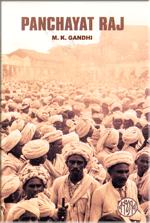
P.O. SEVAGRAM, DIST.WARDHA 442102, MS, INDIA. Phone: 91-7152-284753
FOUNDED BY MAHATMA GANDHI IN 1936
Panchayat Raj

NATURE CURE
Written by : M. K. Gandhi
Table of Contents
- Publisher's Note
- Why The Village Movement?
- Panchayats in Pre-Independence Days
- Panchayats in Independent India
- My Idea of Village Swaraj
- An Ideal Village
- Non-violent Rural Economy
- All-round Village Development
- Village Sanitation
- Rural Medical Relief
- Revival of Village Industries
- Charkha In The Villages
- Other Village Industries
- Duty of Congress Ministries
- Co-operative Cattle Farming
- Village Exhibitions
- Lok Sevak Sangh
- Samagra Gramseva
- Shanti Dals in Villages
About This Book
Written by : M. K. Gandhi
Compiled by : R. K. Prabhu
First Edition :10,000 copies, February 1959
I.S.B.N :81-7229-139-6
Printed and Published by :Jitendra T. Desai,
Navajivan Mudranalaya,
Ahemadabad-380014
India.
© Navajivan Trust, 1960
Download
Chapter-1: Why The Village Movement?
Villagers have suffered long from neglect by those who have had the benefit of education. They have chosen the city life. The village movement is an attempt to establish healthy contact with the villages by inducing those who are fired with the spirit of service to settle in them and find self-expression in the service of villagers. ...Those who have settled in villages in the spirit of service are not dismayed by the difficulties facing them. They knew before they went that they would have to contend against many difficulties including even sullenness on the part of villagers. Only those, therefore, who have faith in themselves and in their mission will serve the villagers and influence their lives. A true life lived amongst the people is in itself an object-lesson that must produce its own effect upon immediate surroundings. The difficulty with the young man is, perhaps, that he has gone to the village merely to earn a living without the spirit of service behind it. I admit that village life does not offer attractions to those who go there in search of money. Without the incentive of service village life would jar after the novelty has worn out. No young man having gone to a village may abandon the pursuit on the slightest contact with difficulty. Patient effort will show that villagers are not very different from city-dwellers and that they will respond to kindliness and attention. It is no doubt true that one does not have in the villages the opportunity of contact with the great ones of the land. With the growth of village mentality the leaders will find it necessary to tour in the villages and establish a living touch with them. Moreover the companionship of the great and the good is available to all through the works of saints like Chaitanya, Ramakrishna, Tulsidas, Kabir, Nanak, Dadu, Tukaram, Tiruvalluvar, and others too numerous to mention though equally known and pious. The difficulty is to get the mind tuned to the reception of permanent values. If it is modern thought—political, social, economical, scientific—that is meant, it is possible to procure literature that will satisfy curiosity. I admit, however, that one does not find such as easily as one finds religious literature. Saints wrote and spoke for the masses. The vogue for translating modern thought to the masses in an acceptable manner has not yet quite set in. But it must come in time. I would, therefore, advise young men . . . not to give in but persist in their effort and by their presence make the villages more livable and lovable. That they will do by serving the villages in a manner acceptable to the villagers. Everyone can make a beginning by making the villages cleaner by their own labour and removing illiteracy to the extent of their ability. And if their lives are clean, methodical and industrious, there is no doubt that the infection will spread in the village in which they may be working.
Harijan,
20-2-1937
My Dream
I have not pictured a poverty-stricken India containing ignorant millions. I
have pictured to myself an India continually progressing along the lines
best suited to her genius. I do not, however, picture it as a third class or
even a first class copy of the dying civilization of the West.
If my dream is fulfilled, and every one of the seven lakhs of villages becomes a
well-living republic in which there are no illiterates, in wnich no one is
idle for want of work, in which everyone is usefully occupied and has
nourishing food, well-ventilated dwellings, and sufficient Khadi for
covering the body, and in which all the villagers know and observe the laws
of hygiene and sanitation, such a State must have varied and increasing
needs, which it must supply unless it would stagnate...
What, however, according to my view, the State will not have is an army of B.A.'s
and M.A.'s with their brains sapped with too much cramming and minds almost
paralysed by the impossible attempt to speak and write English like
Englishmen. The majority of these have no work, no employment. And when they
have the latter, it is usually clerkships at which most of the knowledge
gained during their twelve years of High Schools and Colleges is of no use
whatsoever to them.
Harijan,
30-7-1938